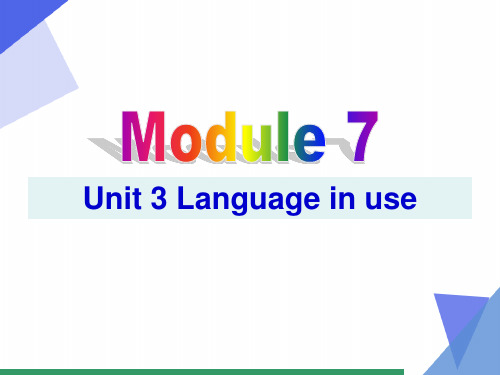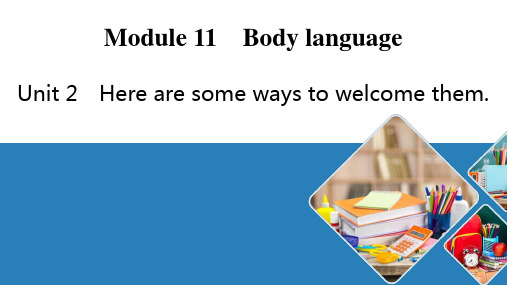外研版七年级下册英语ModuleUnit
外研版七年级英语下册Module5Unit 1 What can I do for you课件

Listening listen and fill
1. How much are the sausages? The sausages are __3_8___ yuan a kilo.
2.Lingling would like_h_a_l_f _a__kilo of sausages. 3.The sausages, a kilo of beans and two lemons are _3_0__yuan. 4.How much are the strawberries?
biscuit [‘biskit]
What else?
Match the words and expression from the box with the pictures.
clothes shop 3 market 1 supermarket 2
Mother’s Day 母亲节 try on 试穿
certainly everything fresh half price size
1. The strawberries look very _fr_e_s_h__ and the _p_r_i_ce_ is only ten yuan a kilo. _E__v_er_y_t_h_i_n_g is so cheap.
supermarket look price Try on fresh sale take (took) wait a minute Try lemon size certainly may(might) Mother’s Day strawberry biscuit market
记忆单词一 定要在正确 拼读的基础 上按音节音 标来记,注 意构词法, 同时英语和 汉语一定要 对上号!
Module 7 Unit 3 七年级英语下册(外研版)

7. — _W__e_r_e__ your friends at your first school difficult. —No, theyw__e_r_en__’t_.
8. —__W__e_r_e_ you happy at your first
1. I was a good pupil in _p_r_i_m_a_r_y__s_ch__o_o_l _. 2. — Where _w__e_r_e_ you __b_o_r_n__?
— In Newton, a small __t_o_w_n__ inAmerica.
3. — Can I play a computer game, Mum? I _a_m__b_o_r_e_d_.
Lead in
Yao Ming Shanghai 1980
When was he born ? He was born in 1980. Where was he born ? He was born in Shanghai.
Luo Jin Jiangxi 1981 When was he born? He was born in 1981. Where was he born? He was born in Jiangxi.
3. — _W__a__s_ Daming born in Beijing. —Yes, he _w_a__s__.
4. —_W___er_e__ they at school on Monday? —No, they _w_e_r_e_n_’_t.
5. —_W___er_e__ they at home this morning? —No, they w__e_r_e_n_’_t.
外研版英语七年级下册Module7 Unit3 课件

I
He/She /It 单数名词
was
不可名
We You They 复数名词
were
★时间状语:yesterday,last night/ week/ month/ year,last Saturday, the day before yesterday,in 1998,five years ago,just now等
-Where was he born? -He was born in Chongqing.
语法探究
Born Twins(Sandy and Mandy) July 31, 2001 Taiwan
-When were they born? -They were born on July 31, 2001.
今年是2020年。那对双胞胎4岁了。 去年是2019年。那对双胞胎3岁。 明年是2021年。那对双胞胎将是5岁。
从例句可以看出,英语一般过去时中动词be的过去式为 _w__a_s, _w_e_r_e_。今uang August 22, 1991 Liaoning
语法分析
be动词的一般过去时
①一般过去时:表示过去发生的动作或存在的状态
②要与表示过去的时间状语连用,如:yesterday,last night/ week/ month/ year,last Saturday,the day before yesterday,in 1998,five years ago,just now(刚才)等。
—I don’t know, but he __w__a_s__ here just now.
3 Complete the sentences with the correct form of be.
外研版英语七年级下册:Module 3 Unit 1 What are you going to d

教学设计外研版七年级下册课题:Module 3 Making plans Unit 1:What are you going to do at the weekend?一.课型; Listening and speaking二.教材分析本单元是第三模块的核心组成部分,以讨论周末计划为主要话题。
该话题比较贴近学生生活,因此学生对介绍自己的周末计划很感兴趣,很容易展开教学活动,便于学生理解运用。
本节课在学生掌握有关周末活动的动词短语的基础上,在大量听说训练的基础上,通过讨论周末计划,学习用be going to 表达自己打算或计划做的事。
三.学生分析本节课的授课对象是七年级学生,他们活泼好动,善于表现自己,大多数学生对英语学习很感兴趣,尤其是在进行口语练习的环节时,都很积极。
本节课在设计用be going to 谈论周末计划这一话题时,设计了大量的pairwork 练习,便于学生根据自己的实际情况展开活动。
这节课的设计以学生感兴趣内容为出发点,以培养学生的听说能力为目的,使学生积极参与到课堂中来。
并充分利用多媒体等教学辅助设备,加强直观印象,增加课堂教学的趣味性。
四.教学目标根据《中学英语课程标准》制定如下目标:语言知识目标1. 学习掌握本课生词与短语:plan, go over, picnic, have a picnic, nothing,silly, fantastic, nobody, housework, else2. 观察并了解be going to 形式的构成, 能简单使用一般将来时(am/is/are going to do sth)3. 通过用英语与同伴谈论自己和周围人们打算做的事, 进一步熟悉be going to的用法。
语言技能目标1.听:能听懂含有be going to 加动词原形所表达的意思,并能听懂他人谈论周末计划的内容。
2.说:能借助所给词组进行pairwork 练习,能用be going to 谈论周末计划。
外研版英语七年级下册Module11Unit2Here+are+some+ways+to

语言点精析
要点1:(P68)You can stand close to people in the Middle East but don't stand too close to North Americans!
在中东,你可以站得离人们近些,但是不要站得离北美人 太近!
【重点探究1】 close作副词,意为“接近地”,常用短语:close to意为 “离……近”。
( T )5.In Greece, it isn't polite to wave to say goodbye.
二、请认真阅读教材P68课文内容,把下面的短文补充完 整
Here are some 1.___w_a_y_s__ to welcome new foreign students.In 2.___B_r_i_ta_i_n___,people don't like to touch others, but in South America, they like to 3.___h_o_l_d__ your arm so you can't 4.__m__o_v_e__ away.Remember to 5.___g_iv_e___ someone from North America lots of 6.___p_e_r_s_o_n_a_l__ space.In some countries, it isn't 7.___p_o_li_t_e___ to look at people when you talk.And it isn't polite to 8.___w_a_v_e__ to say goodbye in Greece.In 9.___f_a_c_t __,it's quite 10.__r_u_d_e___.
外研版七年级下册Module1 Unit 1 Whose bag is this

名词性物主代词=形容词性物主代词+名词
我的· · · · · · mine = my + n. 你的· · · · · · yours = your + n. 他的· · · · · · his = his + n. 她的· · · · · · hers = her + n. 它的· · · · · · its = its + n. 我们的· · · · · · ours = our + n. 你们的· · · · · · yours = your + n. 他们的· · · · · · theirs = their + n.
A:Whose erasers are these ?
B: They‘re our erasers. They‘re ours. 我们的橡皮擦 A:Are these erasers yours ? 你们的橡皮擦 A:Are these your erasers ? B: Yes, they are. yours= your+erasers(名词)
Listen and fill in the conversation.
Ms Li: Welcome back to school, everyone! First of all, come and look in the lost and found box! There are a lot of things in it. Whose bag is this? Lingling: Oh sorry! It’s mine . Are my crayons there too? Ms Li: Are these crayons yours? Lingling: Yes, they are and this eraser too. Thank you. Ms Li: Whose tapes are these? Daming: They’re mine. Ms Li: Here is a purple wallet! Tony: It’s mine. Look! Here’s my name “Tony”! Thank you. Ms Li: You’re welcome! Look at this nice watch. Is it yours too, Daming? Daming: No, it isn’t. I think it’s Betty’s. Lingling: Yes, it’s hers . Ms Li: Everyone, Please be careful with your thing from now on . are Daming: Here ______ some nice gloves. Whose gloves are they? Ms Li: Let me see…Oh, they’re mine! Thank you!
外研版七年级英语下册课件Module 12 Unit 1 It's so beautiful ! (2)

Walk across the bridge,
across
“穿过”,强调从某个 and you'll see a tree.走过 平面的一边到另一边。 那座桥,你会看见一棵
树。
over
“越过,跨越”,强调 从某物的正上面跨越。
The cat jumps over the
wall to play every day. 这只猫每天跳过墙去玩。
4 both/bəʊθ/pron.两者;两个 eg:(泰安中考)My hometown is becoming more and
more beautiful with trees and flowers on both sides of the road. 我的家乡正变得越来越漂亮,路两边都有树和花。
Now listen again and check.
Tony: What kind of music do you like, Dad? Tony’s dad: I like traditional Western music, especially the
sound of violins. What about you, Tony? What kind of music do you like? Tony: I like modern music. I love rock. It’s great. You like rock, don’t you, Mum? Tony’s mum: Yes, it’s very lively. But you don’t like
Everyday English ·What a beautiful city! ·I'm a fan of rock music. ·Give us a break! ·I don't believe it!
新外研版七年级英语下册《Module7 Unit1》优质课课件(共24张PPT)

【对话处理】 1) listen and answer the following questions
1.Where was Lingling born?
√ A. Xucun
B. Cambridge C. in England D. We don’t know.
B. MS Yao. √
2.Who is very friendly? A. Mrs Lane C. Becky D .Adam
Shenglidong Primary School
Make up a dialogue about yourselves.
Work in pairs:
A: Where were you born?
B: I was born in a small village/a big city.
A: What was the name of the village/city?
B: It was ….
Listen and number the questions as you hear them. a) Who was your first teacher? □ 3 × b) What was your first school like? □ 2 √ 1 c) Where were you born? □ d) Was she strict? □ 4
He/She/It We You They
was
were
were
were
Have a test! You are the best! My past life A: What was the name of your primary school, Miss Cai? B: It ______ was Shenglidong Primary School. was the name of your first teacher? A: What _____ was Mrs. Zhang. B: She _______ were your best friends? A: Who _____ were my friends. B: Wang Mei and Liu Li _______
